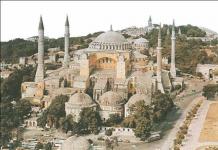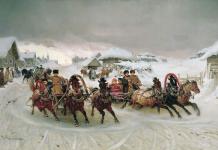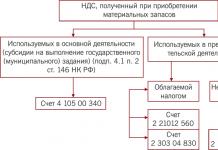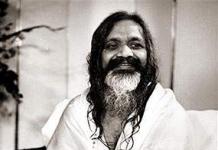PLAN-SUMMARY OF AN OPEN LITERATURE LESSONin the 7th grade
Topic: "Unforgettable world of childhood
in the story of S.T. Aksakov "Childhood of Bagrov-grandson"
Goals: 1) to arouse a persistent reader's interest in Aksakov's work, to establish a spiritual connection between the writer and the Bashkir land;
2) to convince students that childhood is a happy, but at the same time a responsible age of human thought;
3) help to realize the moral duty to parents; instilling a love for nature, for reading books.
Lesson design : exhibition of books by S.T. Aksakov and famous authors about childhood, an exhibition of children's drawings-illustrations for works about childhood, a thematic newspaper and a musical recording "Nostalgia" by F. Giya, a filmstrip "The Scarlet Flower".
Blackboard notes :
“Happy, happy irretrievable time of childhood! How not to love and cherish the memories of her? These memories refresh, elevate my soul and serve as a source of the best pleasures for me ”(L.N. Tolstoy.)
“The character of a person is formed precisely in the first years of life” (Ushinsky.) Dictionary of literary terms:
Fairy tale, essay, story, autobiographical story, epigraph, art, criticism, hero-reader, trilogy-tetralogy.
During the classes.
On the illuminated screen - a scarlet flower (living rose). (Slide number 1) Against the background of the melody, a fragment of the fairy tale by S.T. Aksakov (p. 28 of the fairy tale "The Scarlet Flower"): "An honest merchant walks around, marveling ... And, having spoken these words, he came up and plucked a scarlet flower."
Teacher's word. Of course, you all recognized a fragment of our favorite fairy tale that came to us from childhood, "The Scarlet Flower". This book brings us back to the unforgettable world of “the beginning of all things”, because every person remembers the beginning of his life with tenderness and respect, every person has a memory of childhood.
Krylov and Pushkin, Lermontov and Tolstoy, Turgenev and Chekhov - many writers addressed the theme of childhood in their works. And today we are getting acquainted with the work of a wonderful person S.T. Aksakov and his story "Childhood of Bagrov - grandson." “The unforgettable world of childhood in the story by S.T. Aksakov “Childhood of Bagrov-grandson” is the topic of our literature lesson today.
Our great countryman Sergei Timofeevich Aksakov (Slide No. 2) was born in 1791 in Ufa into an old noble family. His father Timofey Stepanovich was an employee in the Ufa Supreme Court. Mother was also from the family of a prominent official from the village of Zubovo near Ufa. Marya Nikolaevna was distinguished by intelligence and education, she strove for culture and knowledge. She early taught her son to read and write, instilled in him a love of reading. Aksakov spent his childhood in Ufa and in the family estate of Novo-Aksakovo, Buguruslan district, Orenburg province. Aksakov studied in Kazan, first at the gymnasium, then at the university. He served in St. Petersburg in the Commission for drafting laws. After that, he moved to Moscow and, along with poetic creativity, took up theatrical translations. In the last years of his life he was engaged only in literary work.
Sergei Aksakov died in 1859. Buried in Moscow.
The writer loved our region very much, in many of his poems he sang the nature of Bashkortostan. Sergei Aksakov's grandfather Stepan Aksakov had estates in the modern Karmaskala region (the village of Starye Kiishki, nicknamed Sergeevka by him), Belebeevsky (Nadezhdino), Ufimsky regions (Zubovo), near Orenburg (Novo - Aksakovo).
The main place in Aksakov's literary works is occupied by his autobiographical prose.
What autobiographical works do you already know? (L.N. Tolstoy "Childhood. Adolescence. Youth", M. Gorky. "Childhood. In people. My universities").
What is an autobiographical story? (A work of art based on personal impressions, thoughts, feelings).
What is a biography? (The writer's story about his own life, based on real facts of the biography).
How is an autobiography different from an autobiographical novel? (The autobiography is based on the real facts of the writer's life; fiction plays a special role in the autobiographical story, although the writer's personal feelings and impressions are also important.)
But S.T. Aksakov believed: “I am not able to replace reality with fiction. I tried several times to write fictional incidents and fictional people. Complete rubbish came out, and it became funny to me myself ... I can’t invent anything: I don’t have a soul for what I invented, I can’t take a living part in it.
S. T. Aksakov also wrote a trilogy: “Family Chronicle”, “Childhood ...”, “Memories”. (Slide No. 3) In the book “Family Chronicle”, he shows his grandfather, father and mother under the name of Bagrova. And in the book "Children's ..." he describes his, sometimes fragmentary, memories of his loved ones, about Ufa, the village of Zubovo, places that are dear and familiar to us. Aksakov spoke about the idea of the work in the following way: “This should be an artistic reproduction of my childhood years, from the third to the ninth year of my life.” The book, indeed, describes the first 10 years of a child's life spent in Ufa and the villages of the Orenburg province. He gave the hero his name - Seryozha, and another surname - Bagrov. In the story, Aksakov described the story of his childhood, and dedicated it to his granddaughter Olya, who was then 10 years old. So, today we are talking about the childhood of Serezha Bagrov and, it turns out, Aksakov himself.
- Did you like the story? What places did you especially like? And now let's find out if you carefully read the work. On the picture screen. You have to say which episode is captured on them. (Slide number 4).
Childhood is always something special. Let's all remember Tolstoy's words about childhood. ("Happy, happy, irretrievable time of childhood! How not to love and cherish the memories of her? These memories refresh, elevate my soul and serve as a source of the best pleasures for me"). Why do we call childhood the happiest moment in a person's life? (Firstly, this is the happiest and most carefree time. Secondly, you are surrounded by sincere love and care of the closest and dearest people.)
And then one day, “beneficial fate,” as he later wrote, sent him a lucky break. What case? (Retelling of the excerpt “Beneficial fate ...” (pp. 18-19) from the chapter “Arrival for permanent residence in Bagrovo” p. 155)
--- "Children's Reading for the Heart and Mind" was the name of a series of children's books published in twenty parts at the time when the writer lived. The boy did not get a complete collection of works, but only twelve books. And how did the boy take this gift? (The boy was very happy).
Read in the text the words that tell about this feeling of the boy.
(Children find words that reveal the sensual soul of the hero: “Oh, happiness!”, “He was so delighted that he almost threw himself on the old man’s neck with tears”, “not remembering himself”, “shouted”, “afraid that someone would not took away my treasure”, “forgot everything around me”, “I was just like a madman”, “didn’t say anything”, “didn’t understand what they were saying to me”, “didn’t want to go to dinner”, “after dinner I grabbed the book again and read until evening.
Now find in the text the expression by which the author characterizes the reading of the boy. (The author calls the reading “frantic”: “Of course, mother put an end to such frenzied reading ...”)
How can you explain the meaning of this expression after reading this passage? (Frantic means reading with great enthusiasm. But I think that this is such a passion for reading when you don’t even hear anything around and don’t notice. But I think these are some kind of lofty feelings of a boy.)
You understood correctly, guys, you made the right conclusion by reading about the state the boy was in when he read the books. In Ozhegov's dictionary, the word "frantic" is given the following interpretation: "Frenzy is an extreme degree of excitement, passion with loss of self-control." And this means that the reading of the boy took place in a state of strong excitement. And now read on, with what other feeling Seryozha read books. ("I read my books with delight...")
And now I want to draw your attention to the last words of the text. (Children read: “A complete revolution took place in my childish mind, and a new world opened up for me ...”)
How did you understand these final words? (Books opened up a new world of knowledge for the boy. He learned a lot of what he didn’t know before. Seryozha was very inquisitive, but he didn’t know much yet, and books helped him discover secrets. There was a revolution in his mind, which means he became smarter, more educated, better.)
And now I want to read the continuation of this passage from the book: “I learned in the “argument about thunder” what lightning, air, clouds are; learned the formation of rain and the origin of snow. Many phenomena in nature, which I looked at senselessly, albeit with curiosity, received meaning and significance for me and became even more curious ... ”Tell me, guys, what instructive conclusion can you draw for yourself after reading an excerpt from Aksakov’s story? (I concluded how important reading is for every person. Whoever reads a lot knows a lot. A book is a true friend of a person, it teaches a lot. And I remembered the proverb that we talked about in the first grade: “Reading is the best teaching "")
Of all the childhood inclinations of little Seryozha, the strongest was love and passion for reading. Even in early childhood, Aksakov became interested in reading, which was facilitated by the joint readings adopted in the family in the evenings, he gives himself to him with frenzied passion He read various translated books, read with interest, learned a lot almost by heart. It is important that his childhood reading consisted mainly of Russian books, when at that time, "French dominated." As a child, he also became acquainted with the works of famous Russian poets of the 18th century. He also read the fairy tales of Scheherazade in Russian. He read fairy tales to the point of unconsciousness and liked to retell them, introducing whole episodes of his own composition. On long winter evenings, he listens to the gifted storyteller Pelageya, the housekeeper from the serfs. In her fairy tale catalog there were all Russian fairy tales, and many oriental ones. One of them - "The Scarlet Flower" - Seryozha not only learned by heart, but he himself said it with all the jokes, groans and sighs of Pelageya. Seryozha “mimicked” her so well that everyone at home laughed. But none of them suspected that a truly acting talent was hidden in the boy. Inflaming the imagination, he invents adventures similar to those read in books, and tells them as authentic, as if they had happened to themselves. Moreover, Seryozha even competes ... with Scheherazade, inserting incidents and episodes of his own fantasy into her fairy tales. When Seryozha was caught in fiction, he, puzzled, worried and perplexed. And these "additions" were created not by the usual children's imagination, but by the creative fantasy awakening in it. Early awakens in him and "an irresistible, unaccountable desire to convey to others his impressions with accuracy and clarity of evidence, so that the listeners receive the same concept of the objects described" as he himself had about them. This desire, so important, necessary for the future writer, Seryozha apparently inherited from his mother, who owned a rare gift of words.
Let's reflect on what place the parents occupied in Seryozha's life. How does the character of the father appear in the story? Can he be an example for his son? ( Father - Timofey Stepanovich, passionately loved nature. Sergei was also not indifferent to nature, and this is the merit of his father, a gentle person by nature. He developed in his son an affection for hunting, fishing, communication with nature. “Father gave me knowledge,” said the writer.)
The boy was often taken hunting and fishing. He considered such moments to be a great happiness. Once, while fishing, Serezha managed to catch a small roach. Later, he writes about it this way: “... I was trembling all over, as if in a fever, and completely did not remember myself for joy. I grabbed my prey with both hands and ran to show it to my mother ... Mother did not want to believe that I could catch the fish myself, but, panting and stuttering with vehemence, I assured her ... that it was as if I had pulled out this beautiful fish myself .. Mother had no disposition for marriage, she did not even love him, and it hurt me very much that she coldly accepted my joy; and to my great grief, my mother, seeing me in such agitation, said that it was harmful to me, and added that she would not let me in until I calmed down. ”(Children can retell this passage.)
In “The Childhood Years of Bagrov the Grandson,” he spoke about the first joys of a fisherman, which he experienced in childhood. “Uzhenie just drove me crazy! he wrote. “I couldn’t think or talk about anything else…” (P. 29, 30, 149, 188). What did little Seryozha dream about when his mother would not let him in with his father and Evseich? ( "My God," I thought, "when I'm big enough to spend whole days with a fishing rod and a Marmot on the banks of a river or lake.")
In the estate of his father and grandfather in old Aksakov, the future writer had the opportunity to communicate with nature, which he fell in love with self-forgetfulness, became addicted to fishing and hunting, rifle and falconry, to picking mushrooms and berries, to catching birds. Even in the summer, in the heat, in the rain - in any weather, he left the house with a protective visor lowered on his almost blind eyes and sat for hours on the bank of the Vori in Abramtsevo with a fishing rod in his hands. Aksakov even has a number of essays and stories about fishing and rifle hunting - then this was the first time in literature. These are "Notes on fishing" and "Notes of a rifle hunter of the Orenburg province")
What can you say about Serezha's relationship with his mother? Let's read lyrical digressions about Serezha's mother. (Can be taught). (There is no doubt that Serezha’s mother was the dearest person for Serezha. They have an excellent relationship. They understood each other perfectly. Serezha’s mother was charming to everyone around her. She performs a feat of devotion and compassion. For Serezha, she became a savior, a guardian angel. Serezha's mother is associated with the happiest days in his life... "Mother brought up feelings in me," recalls Serezha.)
In childhood, his mother Marya Nikolaevna paid special attention to the formation of the writer. Between them, a rare relationship of trust was established. The mother shares both the sorrows and joys of her son, dispels his doubts, perplexities, speaks to her son as to a friend. Boy tenderly sympathetic attached to mother. Their mutual love and understanding of each other grows. Mother becomes the greatest authority for Serezha, the most beloved and dearest authority in the world. He shares with her everything he sees, everything he hears. and experienced. The closest person in this world is a mother. No matter how old you are, you need a mom. Mom loves and cares for us. Guys, let's be attentive to mothers, take care of them the way Seryozha Bagrov does.
Serezha's parents remained in his soul and memory for the rest of his life. He remembers them, he is grateful to them. Parents are the most precious thing in life. Only he is worthy of respect who remembers and honors the clan, his ancestors.
What is the relationship between brother and sister?
What did you like about the Bagrov family? In their relationship? (They politely address each other. In their communication there are such beautiful expressions as ... This is a very friendly family. I remember how .... The heroes are compliant, frank with each other, friendly. The atmosphere in the family is warm)
Father's house, family is a great wealth. “Happy is he who is happy at home,” Tolstoy wrote. A person who grew up in a kind family thanks her all his life for the joy. Aksakov grew up between loving and beloved people, in a good environment. He was very fond of children. Was a wonderful father. His children recalled that they were grateful to their father for their happy childhood, that they grew up among people who love each other. In the Aksakov family there was an indisputable authority of the father, mutual trust and mutual respect, mutual understanding. The problem of fathers and children has never existed in this family. Belinsky wrote: “Oh, if only we had more such fathers in Russia as old man Aksakov. The themes of S.T. Aksakov's works are eternal: the struggle between good and evil, love and indispensable domestic happiness - all this is so relevant in our troubled times. No wonder the President of the Republic of Belarus declared this year the year of the family and the strengthening of family values.
The kindness and sincerity that his mother brought up in Seryozha prompted the boy to sympathize with the servitude of the serfs. Let us recall the incident at the mill. (In the rich estate of Praskovya Ivanovna’s grandmother, Parashina, the headman was Mironych, whom Seryozha called to himself “a man with terrible eyes.” Looking around the mill with his father, the boy observed Mironych’s rude attitude towards the old man - filling and other peasants and I felt an "internal tremor". Many questions arose in Serezha's mind: "Why does the sick old man suffer, what is the evil Mironych, what is the power of Mikhailushka and grandmother") "... I began to feel an internal trembling. What a confusion of concepts occurred in my head!" - Seryozha is perplexed. An accident at the harvest. “An inexpressible feeling of compassion for those working with such exertion of strength, in the heat of the sun, seized my soul…”
“Dema, spending the night in the Chuvashs, springs, a mill, a decrepit old man - a backfill and a rye field with reapers and reapers, then each object separated and became clear, dark places or spots appeared in these pictures that I did not understand.”
An incident in a public school. "He disturbed the clear silence of my soul."
Autumn Harvest (P. 153) “I came to the greatest amazement ...)
spring plowing “I came to the strongest amazement…”. P.204,211.
How do these reflections characterize Seryozha? (These cases prove that Seryozha lives a complex inner life. He is tormented by questions about how and why the world works this way. Some are rich, some are poor. Communication with people allowed him to feel the inequality between them, generated thoughts about good and evil. Why was the Easter cake for the Bagrovs much whiter than the one used by the courtyards? Beloved mother, whose reasonable judgment Seryozha used to verify his impressions and thoughts, no, no, and she will straighten him up: "It's none of your business" ...)
“My head was older than my years,” complains Bagrov. He complains because such a “head” deprived him of his childish spontaneity, fenced him off from his peers. This age-old mental maturity developed Serezha's habit of analyzing his own feelings and thoughts. He not only lives with impressions. He makes them the subject of analysis, the boy subjects his experiences to introspection, tries to change himself. Aksakov leads us to the idea that the formation of character occurs through overcoming difficult life situations.
Bagrov later recalls that everything he saw led to a "mixture of concepts", produced "some kind of discord in my head", revolted "the clear silence of my soul." But it was external impressions that became for Serezha those, in his words, lessons that had a decisive influence on the formation of his character. A stream of impressions flowed into the soul of the child, open to the world, observant, prone to introspection and self-criticism, and this merging gave beneficial results.
The inner world of the child does not split, does not fall apart. Serezha tries to drown out his doubts in communion with nature. Nature becomes the source of the child's mental health.
Tolstoy considered the greatest merit of "Childhood" to be the love of nature poured into the book, the poetry of nature. The feeling of nature came to the boy, the hero of the book, during the first spring in the village and was formed under the influence of his father Alexei Stepanovich Bagrov and uncle Evseich.
How does Seryozha see the spring nature? Why "the first spring in the village"? (Before this, Seryozha had not seen the onset of spring in the village.)
What do you think, is it important for us readers? (Of course, the first perception is always sharper, brighter, more unexpected, remembered for a long time)
- Find in the text what impression the onset of spring made on Seryozha. (The approach of spring in the village ... I felt a special kind of excitement that I had never experienced.)
- What increased Serezha's excitement? (Conversation about spring with Evseich and with his father)
- Find words that convey the general enthusiasm of the father, Evseich and Seryozha for the arrival of spring.
(Rejoiced like hunters)
- Why did the father, Evseich and Seryozha differently (with joy) perceive everything around? (They were looking forward to the arrival of spring, and therefore the changes around them only made them happy)
– What pictures of nature would you like to emphasize in the story? (Dema, crossing over Belaya, ice drift on Belaya, nature in Sergeevka, Lake Kiishki. Expressive reading of passages about nature. You can give it by heart.)
Serezha surrenders to the experience of nature with such strength and spiritual dedication that it even frightens his mother. In his love for nature, the boy puts not only passion, but also the talent of a naturalist, which he undoubtedly possessed: he establishes signs of the approach of spring, inquisitively watches how nests are made and the offspring of birds are raised.
The boy notices every little thing, gives scope to his childhood imagination: ...
The banks of the river come to life under the spring sun, with all kinds of game,
swimming ducks and passing flocks of birds, which father and Yevseich knew from
It was during this period that the boy felt that merger with nature,
which is so characteristic of the writer Aksakov: "At the end of Thomas' week
that wonderful time began, which is not always friendly, when nature,
awakening from sleep, he begins to live a full, young, hurried life: when everything passes into excitement, movement, into sound, into color, into smell. Then, not understanding anything, not analyzing, not evaluating, not naming anything, I myself sensed a new life in myself, became a part of nature, and only in adulthood, conscious memories of this time, consciously appreciated all its charming charm, all its poetic beauty.
In many of his poems the writer sang of the nature of Bashkortostan and admired its beauty.Attention to the screen. (Slides with pictures of the nature of Bashkortostan). Is it really surprising that the writer so beautifully described the nature of our region and wrote the following lines:
So, we say goodbye to Serezha.Serezha is going to enter the gymnasium. On the eve of this most important event in his life, the story ends. Childhood is over, adolescence is on the threshold. And this threshold is preparing to cross a man who has grown spiritually and morally before our eyes!
How do you remember Seryozha Bagrov - Aksakov? (Seryozha has a good heart. He is sensitive, impressionable, knows how to pity, sympathize with others. He is smart, observant, knows how to think, analyze his actions, suffer because of them. Family is very significant for Serezha. He loves and respects and loves his loved ones, happy in dealing with them. The father is an example for the boy in everything. Seryozha is cordial and kind, he loves and understands animals, they are his friends. He is very sensitive to nature, enthusiastically perceives it, notices every little thing, fantasizes. Seryozha attracts with his sincerity, spiritual simplicity, his love for others. The hero tirelessly watches himself, knows how to analyze his actions, suffers because of them.)
What kind of person is Seryozha if he keeps all these warm memories in his soul?
General word of the teacher. Everything starts from childhood. We come into this world with a pure heart, with an open soul. If a person manages to keep this purity, then everything around him will be bright, clear. And those around you, feeling this warmth, will be kinder and softer.
Aksakov lived a good and honest life. Not being so rich, Aksakov was always ready to help those in need. He supported Gogol's means, helped Belinsky.
And his children grew up just as worthy: Konstantin and Ivan - literature, Grigory - the Governor of the Ufa province. Granddaughter Olga Grigorievna Aksakova founded the first sanatorium - a koumiss clinic for tuberculosis patients.
Aksakov's work calls us to the knowledge of Russia, to goodness, to understanding ourselves in our native land. The book "Childhood of Bagrov's grandson" is a hymn to parents, a hymn to the nature of the native land, a hymn to a happy childhood. The world of Seryozha Bagrov's childhood is beautiful. His childhood is filled with happiness, understanding, love. I really want you to be happy children too. May your childhood not be overshadowed by troubles, illnesses, wars. Let your home be warm and cozy. Be worthy sons and daughters! And the words of the son of S. T. Aksakov Ivan sound like a commandment to us:
Don't let your soul forget
than the forces in youth boiled,
And instead of good, instead of purpose
One desire to love.
Habit is evil. One tired
Her empty spirit is rejoicing ...
Strive, do not be satisfied with the little
And do not put up with your soul!
Homework. Write an essay “How is Seryozha Bagrov close to me?”
please help in literature (A.S. Pushkin From Pindemonti) 1) What is not dear to the lyrical hero of the poem? Why? 2) for what purpose in the poemAre the words of Church Slavonic vocabulary used? Write down 3 examples, give modern meanings. 3) What life values does the lyrical hero of the poem affirm? 4) What does this poem make you think about? What new did you learn about Pushkin by reading this poem?
8. What hero are we talking about? End comparison. What is the basis of the character of the hero? (1 point).... he is no better than them, only his eyes were cold and proud, like those of ____________________. And they talked to him, and he answered if he wanted, or was silent, and when the oldest tribes came, he spoke to them as to his equals. 9. What hero are we talking about? How is the author's attitude towards the hero expressed? Describe the situation in which these words were spoken. What are the features of the landscape in this passage? What typical conflict of a romantic work is realized in this passage? (1 point).
Led them _________. Everyone followed him together - they believed in him. It has been a difficult journey! It was dark, and at every step the swamp opened its greedy rotten mouth, swallowing people, and the trees blocked the road like a mighty wall. Their branches intertwined with each other; like snakes, roots stretched everywhere, and each step cost a lot of sweat and blood to those people. They walked for a long time ... The forest became thicker, and the weight was less than strength! And so they began to grumble at ____________, saying that in vain he, young and inexperienced, led them somewhere. And he walked ahead of them and was cheerful and clear.
Which of the famous Russian writers was a doctor by education?
What unites the names: Maxim Gorky, Demyan Bedny, Anna Akhmatova, George Sand, Brother of my brother, Stendhal?
What book of Chekhov has a geographical name?
When and in what theater was The Seagull first staged?
What was the name of Chekhov's last dramatic work?
When and why did Chekhov refuse the title of academician?
Whose words are these: “Everything should be beautiful in a person: face, clothes, soul, and thoughts”?
What Chekhov's story aroused L. N. Tolstoy's special delight? (According to his daughter Tatyana Lvovna, Lev Nikolaevich read it "out loud for four evenings in a row and said that he had grown wiser from this thing.")
What Chekhov stories make up the so-called little trilogy?
Name Chekhov's last story.
People do not listen to the old cabman when he tries to tell them about his grief. Who listened to him?
The following words belong to the hero of what Chekhov's story: “It is necessary that someone with a gavel should stand behind the door of every happy, happy person and constantly remind by knocking that there are unfortunate people, that, no matter how happy, life will sooner or later show him its claws, trouble will strike - illness, poverty, loss, and no one will see or hear him, just as now he does not see or hear others ”?
Which theater curtain has a seagull on it?
What Chekhov's story is Ochumelov the hero of?
In what work of Chekhov's heroes are Ivan Ivanovich, Fedor Timofeevich and Aunt? (These are not people at all, although they have human names.)
Control questions on the story "Ionych"
What was the name of Startseva?
Where did Kotik make an appointment with Startsev?
How did Vera Iosifovna start her novel?
What was the name of the fourteen-year-old lackey in the Turkins' house, who portrayed a tragic figure and exclaimed: "Die, unfortunate one!"?
Who in his speech used the words “not bad”, “he does not have any Roman law”, “hello please”, “die, Denis, you can’t write better”?
What was the name of the coachman Startsev and how was he dressed?
What was the cat's name?
For what purpose did Kotik leave for Moscow?
How many houses does Ionych have in the city, and what kind of house does he look after himself?
Where does Kotik go to be treated every autumn with his mother?
The book, essentially a memoir, describes the first ten years of a child's life (1790s) spent in Ufa and the villages of the Orenburg province.
It all starts with incoherent but vivid memories of infancy and early childhood - a person remembers how he was taken away from his nurse, remembers a long illness from which he almost died - one sunny morning when he felt better, a strangely shaped bottle of rhein wine, pendants pine resin in a new wooden house, etc. The most common image is the road: travel was considered a medicine. (A detailed description of moving hundreds of miles - to visit relatives, to visit, etc. - occupies most of the "Children's years".) Seryozha recovers after he becomes especially ill on a long journey and his parents, forced to stop in the forest, spread he had a bed in the tall grass, where he lay for twelve hours, unable to move, and "suddenly woke up." After an illness, the child experiences "a feeling of pity for everything that suffers."
With every memory of Serezha, “the constant presence of his mother merges”, who went out and loved him, perhaps for this reason, more than her other children.
Sequential memories begin at the age of four. Serezha lives in Ufa with his parents and younger sister. The disease "brought to extreme susceptibility" the boy's nerves. According to the nanny's stories, he is afraid of the dead, the dark, and so on. (various fears will continue to torment him). He was taught to read so early that he does not even remember it; he had only one book, he knew it by heart and read it aloud to his sister every day; so that when neighbor S.I. Anichkov gave him Novikov's "Children's Reading for the Heart and Mind", the boy, carried away by books, was "just like a madman." He was especially impressed by the articles explaining thunder, snow, insect metamorphoses, etc.
Mother, exhausted by Seryozha's illness, was afraid that she herself fell ill with consumption, her parents gathered in Orenburg to see a good doctor; the children were taken to Bagrovo, to their father's parents. The road struck the child: crossing the Belaya, collected pebbles and fossils - “ores”, large trees, spending the night in the field, and especially fishing on the Dema, which immediately drove the boy crazy no less than reading, the fire obtained by flint, and the fire of the torch, springs, etc. Everything is curious, even “how the earth stuck to the wheels and then fell off them in thick layers.” The father rejoices in all this together with Seryozha, and his beloved mother, on the contrary, is indifferent and even squeamish.
The people met on the way are not only new, but also incomprehensible: the joy of the family Bagrov peasants who met their family in the village of Parashino is incomprehensible, the relations of the peasants with the “terrible” headman, etc .; the child sees, among other things, the harvest in the heat, and this causes "an inexpressible feeling of compassion."
The boy does not like the patriarchal Bagrovo: the house is small and sad, the grandmother and aunt are dressed no better than the servants in Ufa, the grandfather is stern and scary (Seryozha witnessed one of his insane fits of anger; later, when the grandfather saw that "sissy" loves not only mother, but also father, their relationship with their grandson suddenly and dramatically changed). Children of a proud daughter-in-law, who "disdained" Bagrov, are not loved. In Bagrovo, so inhospitable that they even fed the children badly, the brother and sister lived for more than a month. Seryozha amuses herself by frightening her sister with stories of unprecedented adventures and reading aloud to her and her beloved "uncle" Yevseich.
The aunt gave the boy "Dream Interpretation" and some vaudeville, which strongly influenced his imagination.
After Bagrov, returning home had such an effect on the boy that he, again surrounded by common love, suddenly matured. Young brothers of the mother, military men, who graduated from the Moscow University noble boarding school, are visiting the house: from them Serezha learns what poetry is, one of the uncles draws and teaches this Serezha, which makes the boy seem like a “higher being”. S. I. Anichkov donates new books: "Anabasis" by Xenophon and "Children's Library" by Shishkov (which the author praises very much).
Uncles and their friend adjutant Volkov, playing, tease the boy, among other things, because he cannot write; Seryozha is seriously offended and one day he rushes to fight; he is punished and demanded that he ask for forgiveness, but the boy considers himself right; alone in a room, placed in a corner, he dreams and, finally, falls ill from excitement and fatigue. Adults are ashamed, and the matter ends with a general reconciliation.
At the request of Serezha, they begin to teach him to write, inviting a teacher from a public school. One day, apparently on someone's advice, Seryozha is sent there for a lesson: the rudeness of both the students and the teacher (who was so affectionate with him at home), the spanking of the guilty scares the child very much.
Serezha's father buys seven thousand acres of land with lakes and forests and calls it "Sergeevskaya wasteland", which the boy is very proud of. Parents are going to Sergeevka to treat their mother with Bashkir koumiss in the spring, when Belaya opens up. Seryozha can't think of anything else and watches with tension the ice drift and the flood of the river.
In Sergeevka, the house for gentlemen has not been completed, but even this amuses: “There are no windows and doors, but the fishing rods are ready.” Until the end of July, Seryozha, father and uncle Evseich are fishing on Lake Kiishki, which the boy considers his own; Serezha sees gun hunting for the first time and feels “some kind of greed, some unknown joy.” Summer is spoiled only by guests, though infrequent: outsiders, even peers, burden Seryozha.
After Sergeevka, Ufa "got sick of it." Seryozha is entertained only by the neighbor's new gift: Sumarokov's collected works and Kheraskov's poem "Rossiada", which he recites and tells his relatives various details invented by him about his favorite characters. The mother laughs, and the father worries: “Where does all this come from? Don't be a liar." News comes about the death of Catherine II, the people swear allegiance to Pavel Petrovich; the child listens attentively to the conversations of worried adults, which are not always clear to him.
The news comes that the grandfather is dying, and the family immediately gathers in Bagrovo. Seryozha is afraid to see his grandfather dying, he is afraid that his mother will fall ill from all this, that in winter they will freeze on the way. On the road, the boy is tormented by sad forebodings, and the belief in forebodings takes root in him from now on for life.
Grandfather dies a day after the arrival of relatives, the children have time to say goodbye to him; “all feelings” of Seryozha are “suppressed by fear”; He is especially struck by the explanations of the nanny Parasha, why the grandfather does not cry and does not scream: he is paralyzed, "looks with all his eyes and only moves his lips." “I felt the whole infinity of torment, which cannot be told to others.”
The behavior of the Bagrovskaya relatives unpleasantly surprises the boy: four aunts howl, falling at the feet of their brother - “the real master in the house”, the grandmother expressly yields to the power of the mother, and this is disgusting to the mother. Everyone at the table, except Mother, weeps and eats with great appetite. And then, after dinner, in the corner room, looking at the non-freezing Buguruslan, the boy for the first time understands the beauty of winter nature.
Returning to Ufa, the boy again experiences a shock: while giving birth to another son, his mother almost dies.
Becoming the owner of Bagrov after the death of his grandfather, Serezha's father retires, and the family moves to Bagrovo for permanent residence. Rural work (threshing, mowing, etc.) is very busy with Seryozha; he does not understand why his mother and little sister are indifferent to this. The kind boy tries to feel sorry for and comfort his grandmother, who quickly became decrepit after the death of her husband, whom he had not known before, in fact; but her habit of beating the servants, very common in landlord life, quickly turns her grandson away from her.
Seryozha's parents are invited to visit by Praskovya Kurolesov; Seryozha's father is considered her heir and therefore does not contradict this smart and kind, but domineering and rude woman in anything. The rich, albeit somewhat clumsy house of the widow Kurolesova at first seems to the child a palace from the fairy tales of Scheherazade. Having made friends with Serezha's mother, the widow for a long time does not agree to let her family go back to Bagrovo; meanwhile, the bustling life in a strange house, always filled with guests, tires Seryozha, and he impatiently thinks of Bagrov, who is already dear to him.
Returning to Bagrovo, Seryozha for the first time in his life in the village really sees spring: “I<...>followed every step of spring. In every room, almost in every window, I noticed special objects or places on which I made my observations ... ”Insomnia begins in the boy from excitement; so that he falls asleep better, the housekeeper Pelageya tells him fairy tales, and among other things - "The Scarlet Flower" (this tale is placed in the appendix to "Children's Years ...").
In autumn, at the request of Kurolesova, the Bagrovs visit Churasovo. Serezha's father promised his grandmother to return to Pokrov; Kurolesova does not let the guests go; On the night of the Intercession, the father has a terrible dream and in the morning receives news of his grandmother's illness. The autumn road back is hard; crossing the Volga near Simbirsk, the family nearly drowned. Grandmother died on the very Pokrov; this terribly strikes both Serezha's father and the capricious Kurolesova.
The following winter, the Bagrovs are going to Kazan, to pray to the miracle workers there: not only Seryozha, but also his mother has never been there. In Kazan, they plan to spend no more than two weeks, but everything turns out differently: Seryozha is waiting for the “beginning of the most important event” in his life (Aksakov will be sent to the gymnasium). Here the childhood of Bagrov-grandson ends and adolescence begins.
Everything that is written is the absolute truth. And about poor health, and about hobbies, and about being lucky. Children, or rather a child, he will never be forgotten, because he loves him to the point of madness. Sometimes it seems to me that he loves his son more than his mother, who only begs for money allegedly for a child, and spends herself on manicures and pedicures. So, I think that the second marriage can not be avoided. So, your article is excellent.
Yes, everything is written correctly, sociable, open, friendly, reliable, you can always rely on him, but at the same time, the soul of the company, the joker-instigator, always poison jokes. It's all about my dad, I have him as a stone wall for our family and the main ringleader at work and for his friends. And in fact, since childhood, he is very mobile. Since childhood, he has been actively involved in sports. My grandmother told about him that she wanted him to learn how to play musical instruments, enrolled him in a music school. He took notes and went to a music school, but in fact, he threw notes into the bushes, and he himself played football with the boys, only a month later his parents figured out. That's the love of sports.
Everyone respected and understood! And I thought something was wrong with a child with a psyche, such frequent mood swings - aggression, and after that he runs to me and hugs - all this scared me very much. But I can’t do anything and I can’t run away, he’s my child. I hope that with age it really will all go away, otherwise I don’t know what to do. This fall he is going to grade 1, let's see how our affairs will be)
Good afternoon my dad is Seryozha, so it’s definitely written about him here! that a man-idea is so for sure! if he has some idea or business, then all other worries go by the wayside and he doesn’t notice anyone or anything))) mom calls it “on fire”))) dad has a lot of friends and we always have some kind of - that feast.
There are many friends with this name in my environment, and most importantly, my favorite person is Gray!!!
So, I have never met more reliable, sexy, attentive, kind, strong, handsome men with a great sense of humor!!! The name is super! Something is similar, but something is not, the name, of course, gives a lot to a person, but the name is not the point.
My grandfather is Sergei. Wonderful person! I can tell that he is a real man. He is economically caring, strong and sensitive. He loves his grandchildren, that is, us, very much. My brother and I spend all our childhood with their grandmother in the village. Our grandfather is still that virtuoso! By the way, it is rightly noted that he is ready to marry a woman with a child. We did just that. He is not our own grandfather, but it does not matter, he loves us as his own. And in general, I want to say, as far as I know Sergeyev, all men sympathize with me with their attitude to life, their successes in work and personal life.
My husband is Sergei. Not about him at all.
In Russian literature of the 19th century, the theme of childhood became one of the central themes in the work of writers. S.T. Aksakov, V.M. Garshin, V.G. Korolenko, L.N. Tolstoy, A.P. Chekhov, F.M. Dostoevsky, D.N. Mamin-Sibiryak and others embodied the children's theme in their works.
Childhood is presented by writers as a time of innocence and purity. Children are incomparably more moral than adults. They do not lie (until they are brought to this by fear), they approach their peers without asking if he is rich, if he is equal in origin. Children need to learn to understand the true goodness and truth. Such is the poetization of childhood in the Russian classics: “Childhood” by L.N. Tolstoy, "Childhood of Bagrov-grandson" S.T. Aksakov.
From the middle of the XIX century. the theme of childhood is constantly present in the creative minds of Russian writers. I.A. also refers to childhood as the main period that forms the personality. Goncharov in Oblomov, and M.E. Saltykov-Shchedrin in "Lords of the Golovlevs". This theme acquires the most complete expression in the works of L.N. Tolstoy in his "Childhood", "Adolescence", and "Youth".
"Childhood of Bagrov-grandson" S.T. Aksakov
The family has always been a prototype of folk life in Russian literature: Pushkin's Grinevs, Turgenev's Kalitins, Tolstoy's Rostovs, and so on. The Bagrov family occupies a special place among them, because the Aksakov family stands behind it.
"Childhood years of Bagrov-grandson" by Sergei Timofeevich Aksakov is a book about the years of the writer's distant childhood, about people and destinies of the past. With complete truthfulness, Aksakov told about everything that he had experienced in childhood, from the first barely perceptible sensations to the finest gamut of human feelings.
The biggest advantage of the book Aksakov L.N. Tolstoy considered the love of nature, the poetry of nature. The feeling of nature came to the boy, the hero of the book, during the first spring in the village and was formed under the influence of his father Alexei Stepanovich Bagrov and uncle Evseich. The banks of the river coming to life under the spring sun, with all kinds of game, the swimming ducks and the passing flocks of birds, which father and Yevseich knew by their voices, filled the boy's heart with delight. It was during this period that the boy felt that fusion with nature, which is so characteristic of the writer Aksakov: “At the end of Thomas’s week, that wonderful time began, which is not always friendly, when nature, waking up from sleep, begins to live a full, young, hasty life: when everything passes into excitement, movement, into sound, into color, into smell. Then, not understanding anything, not analyzing, not evaluating, not naming anything, I myself felt a new life in myself, became a part of nature, and only in adulthood, conscious memories of this time, consciously appreciated all its charming charm, all poetic beauty. .
Nature has a beneficial effect on the child. The boy affectionately and sympathetically becomes attached to his mother. Their mutual love and understanding of each other grows. Mother becomes the greatest authority for Serezha, the most beloved and dearest authority in the world. He shares with her everything he sees, hears and experiences. The kindness and sincerity that his mother brought up in Seryozha encouraged the boy to sympathize with the servitude of the serfs. In the rich estate of Praskovya Ivanovna's grandmother, Parashino, the headman was Mironych, whom Seryozha called to himself "a man with terrible eyes." Examining the mill with his father, the boy observed Mironych's rude attitude towards the old backfill and other peasants and felt an "internal trembling". Many questions arose in Serezha's mind: "Why does the sick old man suffer, what is the evil Mironych, what is the power of Mikhailushka and grandmother."
Peasants come to Sergei's father with various requests and leave with nothing, and peasant women again come to his mother with requests for dues, but Sofya Nikolaevna does not want to listen to them and limits her favors only to advice to the sick and medicines from the first-aid kit. The manager Mironych offends the peasants, indulging his relatives and rich peasants, and, despite this, is considered a good person, and Seryozha cannot come to terms with the idea that "Mironych can fight without ceasing to be a kind person." Grandmother beats a serf girl with a belt whip for a small offense, and the boy flees in horror from her room. There are many such facts in Aksakov's memoirs, but these cases, each individually and all together, do not cause serious spiritual upheavals in him and do not lead to conflict with the serf environment. On the contrary, under the influence of the elders, under the influence of the whole system of social relations, firmly established and not raising doubts in anyone, the young Aksakov learns to look at everything that happens around him as it should, natural, unshakable. Perplexed questions, remaining unanswered, cease to disturb his conscience. He is fully convinced that the peasants love him, his parents, and their masters in general. Aksakov does not miss an opportunity to mention the manifestation of the “love” of the peasants for their masters whenever he depicts the arrival, departure, or any other case that presupposes the obligatory expression of peasant “love”. Only once does Aksakov show one "unusually smart peasant" who "as if praising his master, and at the same time exposing him in the most ridiculous form." Young Bagrov took the very possibility of such an attitude of a peasant towards a master as an interesting discovery; it piqued his curiosity, but nothing more. Already in early childhood, the well-being of the landowner was firmly and unshakably strengthened in him. “I knew,” Aksakov tells about his childhood years, “that there are gentlemen who give orders, there are servants who must obey orders, and that when I grow up I myself will belong to the number of masters and that then they will obey me … » .
Aksakov shows primary interest in the inner world of his hero. With close attention he follows the emergence and development of spiritual movements, even the most insignificant ones. Mental maturity ahead of age has developed in Serezha the habit of analyzing his own feelings and thoughts. He not only lives with impressions. He makes them the subject of analysis, looking for appropriate interpretations and concepts for them and fixing them in his memory. When the hero of the story fails, Bagrov, who has matured and remembers, comes to the rescue. And throughout the book we hear two voices. Knowledge about the external world is expanding, deepening - and more and more often comes the desire for its practical development. And even if the need for physical labor did not weigh on Serezha, the need for labor, inalienable from human nature, powerfully awakens in him. Seryozha not only admired the delights of field work. He also noticed how unbearably heavy they were for the serfs. And, having matured, he not only sympathizes, he is convinced of the "importance and sanctity of labor", that "peasants and peasant women are much more skillful and dexterous than us, because they know how to do what we do not know how."
The wider the horizons of Serezha's world expand, the more insistently the facts invade it, violating its harmony. Serezha’s mind does not fit in any way, why the evil headman Mironych, who drives the peasants to corvée even on a holiday, is considered by the peasants themselves to be a kind person, why the Easter cake for the Bagrovs “was much whiter than what the courtyard people used to break their fast?” . Some of these many "whys" remained unanswered. Even his beloved mother, whose “reasonable court” Seryozha used to check his impressions and thoughts, and she, no, no, and even straighten him up: “It’s none of your business.” Other “whys” touched on such relationships that children, with their innate justice, could not understand at all, much less justify. All this led to a "confusion of concepts", produced "some kind of discord in the head", and outraged the "clear silence of the soul." The world of adults, which is not always clear to children, begins to shine through with a direct, natural, purely human child's gaze. And much in it begins to look not only strange, but also not abnormal, worthy of condemnation.
Experiencing the disharmony of the outside world, Seryozha comes to the consciousness of his own imperfection: a critical attitude towards himself awakens in him, “clear silence” is replaced in his soul by childishly exaggerated doubts, searches for a way out. But the inner world of Serezha does not split, does not fall apart. It is qualitatively modified, filled with socio-psychological content, it includes situations and collisions, in overcoming which the formation of a person proceeds, preparing him for equal participation in life.
The narration in "The Childhood Years of Bagrov the Grandson" stops on the eve of the most important event in Serezha's life - admission to the gymnasium. Childhood is over.
Having been published, “The Childhood Years of Bagrov the Grandson” immediately became a textbook classic. The book received rave reviews from contemporaries. Everyone agreed on one thing: in recognizing the outstanding artistic merits of this book, the rare talent of its author.
Aksakov's story is, first of all, an artistic depiction of the childhood years of his own life. In order to give the facts and events of his distant past a typical meaning, the author of these artistic memoirs hides under the guise of an outside storyteller, conscientiously recounting what he heard from Bagrov the grandson. Since the narration is conducted on behalf of its main character, the author's "I" and the author's speech almost completely merge with the image and speech of Bagrov the grandson himself. His attitude to the events described, as a rule, expresses the author's attitude towards them.



































